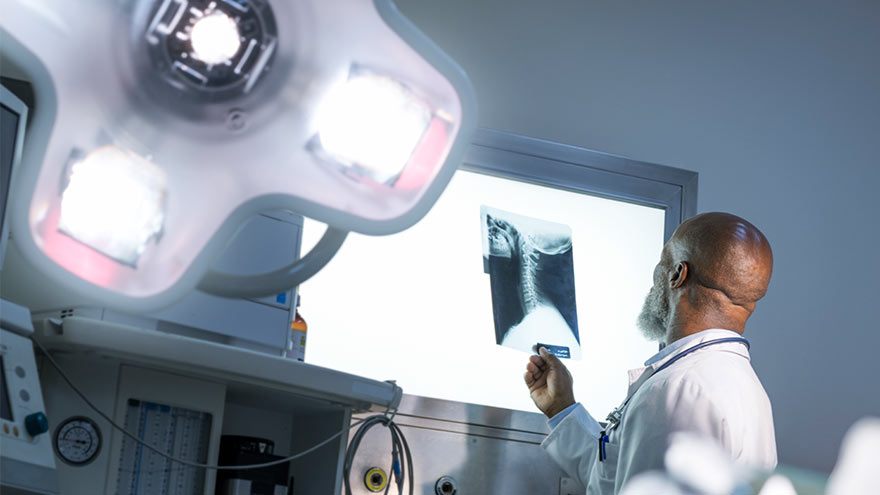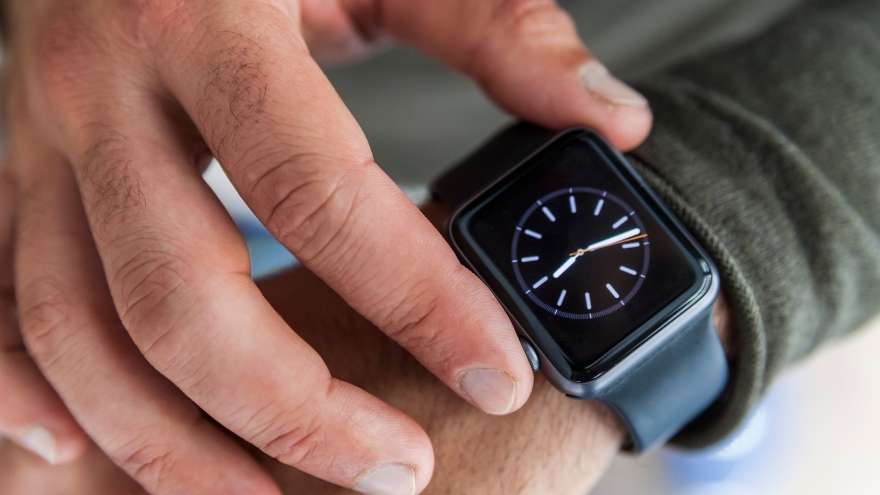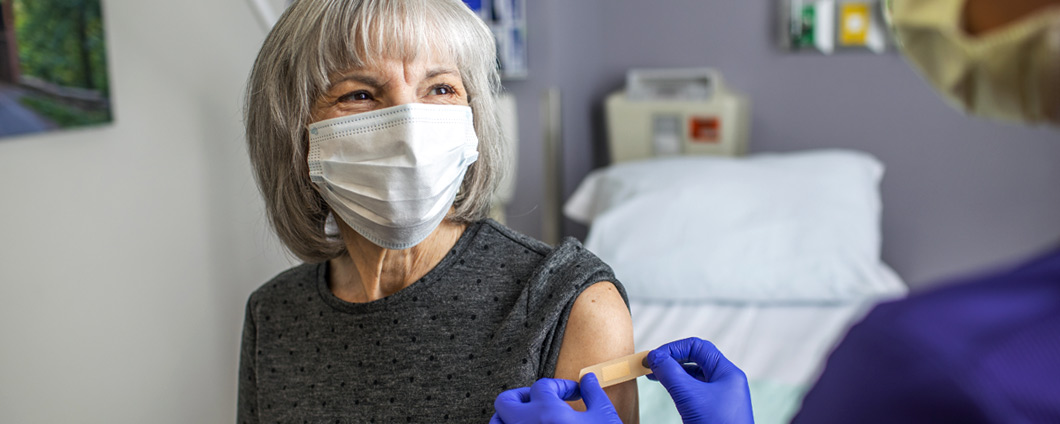Search
Results for 'primary care'
Clear-
Your Top 5 Questions about TAVR Answered
Your heart is the muscle in charge of pumping blood to your entire body. This vital organ is made up of chambers, valves and blood vessels. Your heart valves work similarly to a one-way door: they open and close, controlling blood flow in the correct direction through the heart chambers. For patients who have been diagnosed with a heart-related condition like aortic valve stenosis (narrowing), it is important to know treatment options. Most might think open-heart surgery is the only way to treat a heart valve, but many hospitals, including Renown, also offer a minimally invasive procedure called a Transcatheter Aortic Valve Replacement (TAVR). Dr. Abhilash Akinapelli of Renown Institute for Heart & Vascular Health shares his answers to the top five TAVR questions: 1. What causes aortic valve stenosis? Aortic valve stenosis can be caused by a variety of factors. The main reasons being wear and tear of the valve due to aging; genetically abnormal heart valve (bicuspid aortic valve); long-standing high blood pressure; and other reasons like radiation exposure. 2. Am I a candidate for TAVR? Renown’s heart care teams are made up of your primary care provider, cardiologist and cardio thoracic surgeon. They will evaluate if patients are a good candidate for the TAVR procedure by performing a variety of screenings and tests. Some of these include: Echocardiogram Electrocardiogram (ECG or EKG) Chest X-ray Exercise tests or stress tests Cardiac computerized tomography (CT) scan Cardiac catheterization 3. What are the advantages of the TAVR procedure? The Transcatheter Aortic Valve Replacement (TAVR) procedure is much less invasive than open heart surgery, otherwise known as a Surgical Aortic Valve Replacement (SAVR). Patients can typically return to their normal lifestyles within a week after leaving the hospital. During the TAVR procedure, a stent valve mounted on a balloon is advanced to the heart through the blood vessels in the groin without any incision. Once in position, the balloon will be inflated to firmly expand the new valve inside the diseased old valve, pushing it away to the sides. Once the new valve is in place, it begins working immediately and the deflated balloon is removed. The surgical procedure is approximately one hour long. Patients can get up and walk after four hours and will be discharged the following day if no complications arise. Compared to a SAVR, recovery time is much shorter and less risky for patients above the age of 75. A big advantage for anyone who fits under the criteria for a TAVR. 4. Is the procedure painful? The TAVR procedure is not surgery, but you will still be asleep during the procedure. Since no incision is made, it is essentially a painless procedure. Patients may experience slight discomfort such as aches and pains at the entry site of the catheter. 5. Can I have an MRI and X-rays done after having a TAVR valve? Yes, patients can have MRI scans and X-rays after TAVR. For further questions and information about the TAVR procedure, please consult with your Renown heart care team at 775-982-2452 or through MyChart.
-
Getting to the HEART of Research
In February, we think about hearts not just in honor of Valentine’s Day but because it is American Heart Association Month. This is a great reminder to focus on our personal cardiovascular health. Renown Health helps patients think about their heart health with our world-class providers and cutting-edge treatments through our Cardiovascular Clinical Trials. “Research serves a vital role in the future care of cardiovascular diseases. Being involved in research will help our medical community to further discover new treatment plans in our quest for life preservation and extension,” Dr. Thomas To, Cardiologist and Researcher at Renown Health. For example, let’s talk about atherosclerosis. When our hearts are healthy, they are a strong muscle that pumps our oxygen-rich blood through our coronary arteries. Over time, cholesterol and fats can build up in our arteries. This is a condition known as atherosclerosis. This type of plaque buildup in the arteries can lead to a heart attack or stroke if not properly managed. If you are experiencing chest pain or discomfort, shortness of breath or pain in areas of the upper body, these can be the warning signs of a heart attack, and you should call 911. One contributing factor to atherosclerosis is elevated lipoprotein(a) levels and the accumulation of cholesterol in the arteries, which increases the likelihood of a heart attack or stroke. Lipoprotein(a) is tested separately from the standard panel that is completed for cholesterol management, and while your total cholesterol levels may be in a healthy range, lipoprotein(a) levels can still be elevated. "Increasingly we are realizing that lipoprotein(a) levels can be used as an important assessment in more carefully delineating an individual's risk of future cardiovascular events and treatment targets" said Dr. Michael Bloch, Lipid Specialist and Researcher at Renown Institute for Heart and Vascular Health. While it is clear that elevated lipoprotein(a) contributes to atherosclerosis, there are currently no approved medications for reducing cardiovascular disease risk through reducing lipoprotein(a) levels. This is why Renown Health’s Research Office is proud to offer a phase III clinical trial, called the OCEAN(a) study, to our patients with elevated lipoprotein(a) levels as a care option for management of their heart disease risk. Our teams of expert providers and researchers are here to support you on your healthcare journey. “I am thrilled to be able to be part of this study and bring opportunities like this to our patients. The highlight of my day is getting to hear life stories from my patients during our study visits,” Lisa Preciado, Primary Clinical Research Coordinator for the OCEAN(a) study said. Join us in raising awareness around American Heart Month by talking to your provider about lipoprotein(a) at your next appointment. At Renown Health, our goal is to make it easy for patients to access clinical research as a care opportunity where patients can access a variety of standard care treatment options for their health condition or choose to participate in a clinical trial. For more information about clinical trial opportunities available to you or to ask any questions, contact the Renown Research Office at Renown-CRD@renown.org or 775-982-3646.
-
Heart Failure Risks and Expecting the Unexpected
For the average person, detecting the signs of heart failure can be tricky, especially since people can look fairly healthy and have few symptoms. We asked Christopher Rowan, M.D., of the Renown Institute for Heart & Vascular Health, to answer our most pressing questions about heart failure. Even with more technology in medicine and a greater awareness about health today, the Centers for Disease Control and Prevention still reports that one in every four U.S. deaths is caused by heart disease. The real tragedy of heart-related deaths is that they are both common and preventable. “Heart failure can have many forms that are seen in anyone at any age," says Christopher Rowan, MD, with Renown Institute for Heart & Vascular Health. "As many forms as it has, it can also have as many causes. Although the symptoms of heart failure are numerous, people can look mostly healthy and have relatively few symptoms.” We sat down with Dr. Rowan to ask some common questions about heart failure. How can I tell if I have heart failure? What are some sure signs? "The signs and symptoms of heart failure are numerous, but the most common ones are shortness of breath when trying to walk (which differs from somebody’s normal pattern); progressive swelling in the feet, legs and ankles that does not disappear overnight; and waking up at night due to shortness of breath or waking up more than normal to urinate," Dr. Rowan says. Can heart failure be cured? "The treatment of heart failure depends on its primary cause," Dr. Rowan says. "Various forms of heart failure can be cured; however, the person is always at risk for recurrence. Some forms of heart failure have no cure but can be managed and stabilized and people can live a relatively normal life for years." What can I do to prevent heart failure? "To prevent the onset of heart failure, know your risk factors, including high blood pressure, diabetes, smoking and an unhealthy lifestyle," Dr. Rowan says. "If you have any of these risk factors, work to get them under good control and stop smoking. If you are overweight, start a daily routine where you walk at least 45 minutes per day, 5 days per week. Walking is the best exercise for your cardiovascular health." To learn more, visit the Heart Failure Program at the Renown Institute for Heart & Vascular Health. We want to hear your story! If you or a friend have been treated for a heart condition at Renown Health and are interested in chatting with us about your experience, please email your contact information to support@renown.org so we can follow up.
Read More About Heart Failure Risks and Expecting the Unexpected
-
6 Tips for Safe Snow Shoveling
While the appearance of a winter wonderland in your yard can be a welcome one, an accompanying aspect is not: the idea of clearing your driveway and sidewalks. The sometimes-daunting task of snow shoveling is a repetitive activity that can cause muscle strain to the lower back and shoulders. However, by following the tips below, you will spend more time appreciating your winter wonderland -- when your sidewalk and driveway are all clear, that is. But, we all know that injuries happen, and if you do find yourself with back pain that does not resolve in a few days, contact your primary healthcare provider, or visit a Renown Urgent Care. Another way to avoid injury during strenuous activity, or help heal an injury that won't go away, is to work with a physical therapist who can offer at-home exercises to keep your body strong. 6 Tips for Safe Snow Shoveling Following these tips from the American Physical Therapy Association can help you avoid injuries: Lift smaller loads of snow, rather than heavy shovelfuls. Be sure to bend your knees and lift with your legs, rather than your back. Use a shovel with a shaft that lets you keep your back straight while lifting. A short shaft will cause you to bend more to lift the load. Using a shovel that’s too long makes the weight at the end heavier. Step in the direction where you are throwing the snow to prevent the low back from twisting to help prevent “next-day back fatigue.” Avoid excessive twisting because the spine cannot tolerate this motion. Bend your knees and keep your back as straight as possible so that you are lifting with your legs. Take frequent breaks when shoveling. Stand up straight and walk around periodically to extend the lower back. Backward bending exercises while standing will help reverse the excessive forward bending of shoveling. Stand straight and tall, place your hands toward the back of your hips and bend slightly backward for several seconds. When in doubt, ask for help. The Reno community is a generous one and you can typically find snow shovelers for hire on local message boards like Nextdoor and Facebook. Or, if you have a kid in your neighborhood, they might be looking to make some extra money on a snow day.
-
Renown Children's Hospital
Renown Children's Hospital is proud to be northern Nevada's only pediatric hospital. The Renown Children’s ER is the region's only Level II Pediatric Trauma Center and is open 24 hours a day, seven days a week. With pediatric specialists, child-sized equipment and family-centered care, it’s the first and only facility of its kind in Reno-Tahoe. Whether your child requires a pediatric appointment, a sports physical, or emergency medical attention, our pediatric care is focused on providing compassionate support to both patients and families.
-
Awareness Saves Lives: Renown Goes Blue for Colorectal Cancer Awareness Month
After a year of possibly delayed colorectal cancer screenings due to theCOVID-19 pandemic, it’s more important than ever to raise awareness for colorectal cancer. March is National Colorectal Cancer Awareness Month- a time to raise awareness for colorectal cancer and the importance of routine, life-saving screenings. Renown invites the community to join the organization in helping put an end to the preventable disease. Blue is the designated color to bring awareness to colorectal cancer and those impacted by it. The iconic “LOVE” sculpture at the main entrance of Renown Regional Medical Center located at 1155 Mill Street in Reno, Nev. will shine brightly in blue each evening in March, serving as a visual reminder to passersby to schedule a colorectal screening. The Colorectal Cancer Alliance estimates 149,500 new cases of colon cancer will present in 2021 alone. While colorectal cancer may be the second deadliest cancer in men and women combined, it is also one of the most preventable cancers with screenings. “Unfortunately, due to the COVID-19 pandemic, there’s been a decline in colorectal screenings nationwide,” said Tony Slonim, MD, DrPH, President and CEO of Renown Health. “We know early detection is key in preventing the spread of any cancer, and with regular screenings, we know colorectal cancer is easily detectable and treatable. As a cancer survivor, I know how important it is to get back on track with regular screenings and preventive care. Making your health a priority now will help you experience a healthier and brighter tomorrow.” “We invite the community to join us at Renown in spreading awareness about colorectal cancer and its prevention,” said Susan Cox, director of cancer services at the Renown Institute for Cancer. “It takes all of us to put an end to colorectal cancer. If you’re up to date on your screenings, remind a loved one to schedule their next screening--as your reminder may have the power to save their life.” “Colorectal cancer usually forms from precancerous polyps, or abnormal growths, in the colon or rectum, which can become malignant without presenting any symptoms. Screening tests like stool tests, colonoscopies, and others can detect these precancerous polyps, so they can be removed by a physician before turning into cancer. Screening tests can also find colorectal cancer early, resulting in better treatment outcomes,” says Christos Galanopoulos, M.D., MBA, oncologic surgeon, VP Renown Health & Chair of Surgery for Renown Health. Dr. Galanopoulos adds, “Most people begin screening for colorectal cancer after turning 50. However, some individuals may begin screenings earlier if they have an increased risk of colorectal cancer, such as a family history with the disease. Regardless of one’s personal or family history of colorectal cancer, it’s important to talk to your doctor about the right time to begin your screenings.” Max J. Coppes, MD, Cancer Center Director, Renown Institute for Cancer adds, “While routine screenings are the only way to determine colorectal health, some healthy habits may reduce your risk for colorectal cancer. These factors include maintaining a healthy weight, being physically active, eating a diet rich in fresh fruits, vegetables and whole grains, limiting alcohol intake and not smoking.” Dr. Coppes explains that, “1 in 500 Americans will test positive for Lynch Syndrome, a genetic condition that raises your risk of colon cancer, endometrial cancer, and other cancers. It is also known as hereditary nonpolyposis colorectal cancer. People with Lynch Syndrome are also susceptible to colon polyps at a younger age. The Healthy Nevada Project research team is looking at the occurrence of important inherited genetic variants in our population that increase the risk of certain diseases. These include Familial Hypercholesterolemia, Hereditary Breast and Ovarian Cancer Syndrome and Lynch Syndrome.” To enroll in The Healthy Nevada Project, a clinical study (saliva test) offering the opportunity to learn about your ancestry, diet insights and genetic risks linked to heart disease and certain cancers, including prevention strategies, at no cost, enroll here. For a limited time, Nevada residents may request a free DNA test kit that will be shipped to your home. Renown experts encourage every adult to talk to their doctor about their colorectal cancer risk and screening options. Those looking to schedule a screening or establish care with a Renown primary care provider are invited to call us at 775-691-7308 or visit our website for more information. About Renown Health Renown Health is the region’s largest, locally owned and governed, not-for-profit integrated healthcare network serving Nevada, Lake Tahoe and northeast California. With a diverse workforce of more than 7,000 employees, Renown has fostered a longstanding culture of excellence, determination and innovation. The organization comprises a trauma center, two acute care hospitals, a children’s hospital, a rehabilitation hospital, a medical group and urgent care network, and the region’s largest, locally owned not-for-profit insurance company, Hometown Health. Renown’s institute model addresses social determinants of health and includes: Child Health, Behavioral Health & Addiction, Healthy Aging and Health Innovation. Clinical institutes include: Cancer, Heart and Vascular Heath and Neurosciences. Renown is currently enrolling participants in the world’s largest community-based genetic population health study, the Healthy Nevada Project®.
Read More About Awareness Saves Lives: Renown Goes Blue for Colorectal Cancer Awareness Month
-
Head, Neck and Oral Cancers: How You Can Spot and Treat Them
Head, neck and oral cancers account for just 3 percent of all cancer in the U.S. and can be hard to diagnose. Dr. Abhinand Peddada, radiation oncologist with the Renown Institute for Cancer, explains. While you likely don’t frequently hear about head, neck and oral cancers — they are significantly less common than many kinds of cancer — they can be extremely dangerous. One of the primary reasons: some symptoms mimic the common cold, making them difficult to detect without a medical professional. We asked Abhinand Peddada, M.D., radiation oncologist with the Renown Institute for Cancer, to break down the symptoms and lifestyle risks of these rare cancers. First off, what are some of the signs and symptoms of head, neck and oral cancers? Symptoms can vary based on where the cancer is. For example, throat cancer may show up as a persistent sore throat, while sinus cancer may present as soreness or pressure in the sinuses that doesn’t get better. Some other symptoms to watch may include: Swelling in the throat Painless swelling in the neck Red or white patches in the throat Hoarseness Bloody noses or blood in the mucus or saliva A new and unexplained lump or bump anywhere on the face, neck, mouth or throat Difficulty breathing Difficulty swallowing, chewing or moving the muscles in your face, neck, mouth or throat Bad breath, even with good oral hygiene Loose teeth Dentures or retainers that no longer fit Double vision Who is most at risk for head, neck and oral cancers? Both men and women can develop head, neck and oral cancers, but men are at almost twice the risk of women. People over the age of 40 are also at a higher risk, and these cancers tend to be more common in African Americans. Tobacco use — including cigarettes, cigars, pipes and chewing tobacco — is another risk factor. Tobacco is linked to 85 percent of head and neck cancers. Exposure to fumes and chemicals can increase your risk as well. We’re also seeing more HPV-related head and neck cancers in the U.S., so patients with HPV may want to watch more closely for symptoms. What about screening and prevention? Your dentist already looks for signs and symptoms at your regular dental checkups. Additionally, if you have one of these risk factors and are experiencing signs and symptoms, it’s a good idea to check with your doctor about possible screenings. To help prevent these types of cancers, try to minimize your controllable risk factors. This means quitting tobacco, watching your alcohol consumption and taking care of your oral hygiene by brushing and flossing regularly. We also recommend the HPV vaccination for both boys and girls starting at age 11. By vaccinating at an earlier age, one is less likely to develop oral HPV. What do diagnosis and treatment look like for these cancers? At Renown Institute for Cancer we offer the most advanced diagnostic testing available including fiberoptic photos, CT and PET scans, as well as MRIs. Together, you and your care team will decide which treatment best fits your needs. For these types of cancers, treatment options include radiation, chemotherapy and surgery. Renown Institute for Cancer | 775-982-4000 At the Renown Health Institute for Cancer, our experienced team provides the support and care to maintain the highest quality of life and then achieve the best possible outcome, all in one location that’s close to home. Our dedicated team, clinical expertise and advanced treatment options allow us to tailor care to each patient. Learn about: Our Team Cancers We Treat Screening and Prevention Treatment Options Find a Cancer Doctor
Read More About Head, Neck and Oral Cancers: How You Can Spot and Treat Them
-
Top 3 Cholesterol Questions Answered
With more than 29 million adult Americans having high cholesterol, it’s important to know the facts. We asked Jayson Morgan, MD, a cardiologist with Renown Institute for Heart and Vascular Health, explains the numbers, the risk factors and how to maintain healthy levels. What is cholesterol? There are two types: Low-density lipoprotein (LDL) cholesterol, also known as the “bad” variety, because it can eventually build up within the walls of your blood vessels and narrow the passageways. High-density lipoprotein (HDL), also known as the “good” variety, because it helps remove other forms of cholesterol from the bloodstream. In adults, total cholesterol is considered high if it is more than 200 mg/dL. If the total is more than 200 or if high-density lipoprotein (HDL) levels are less than 40, your heart and brain may not be getting as much oxygen-rich blood as they need. This puts you at greater risk of heart attack and stroke. HDL levels greater than 60 mg/dL can actually lower your risk. What are the risk factors for high levels? Diet high in saturated fat Excess body weight Lack of exercise Smoking Family history Age (as people age, they are more prone to high levels) How often should someone get their numbers checked, and what kind of test is done? The American Heart Association recommends all adults age 20 or older have their cholesterol checked every four to six years. Those with cardiovascular disease or who are at higher risk of it may need their levels and other risk factors assessed more often. Your primary care provider can perform the test, along with assessing your other risk factors to help determine a treatment plan if necessary. The test will likely be one you will need to fast for, meaning no food, beverages or medications for around nine to 12 hours. Your healthcare provider will let you know if, and for how long, to fast. A simple blood test is all that’s needed to get your levels. What are some ways to lower “bad” cholesterol and raise “good” cholesterol? To achieve healthier levels, people should: Eat a heart-healthy diet: Choose healthier fats, eliminate trans fats, eat foods rich in omega-3 fatty acids and increase soluble fiber. Increase physical activity: Exercise on most days of the week. Quit smoking: If you smoke, it’s time to stop. Quitting smoking will improve HDL “good” cholesterol levels. Lose weight: Losing as little as five to 10 percent of your weight can improve cholesterol levels. Drink alcohol only in moderation. And finally, if lifestyle changes aren’t enough, your care provider might recommend medication to help lower your numbers. Renown Institute for Heart & Vascular Health For optimal heart health, the American Heart Association encourages you to “Know Your Numbers” which include: blood pressure, body mass index (BMI), cholesterol and fasting blood sugar, by scheduling a visit with your doctor. These numbers are critical in assessing your current risk for heart disease and stroke. Find a Cardiologist
-
Smart Watch Notification Saves a Life
In sailing, when you encounter rough seas, you can’t change the wind pattern, but you can adjust your sails. The same rings true for life. We confront unpredictable circumstances daily, but how we react to them can make all the difference. For Renown patient and avid sailor Robert (Dan) Seifers, recent events make this mantra reign true. A Concerning Alert Monday, Aug. 22, started out just like any other day for Dan. He was on a walk with his dog, enjoying the sunshine, when suddenly he felt a wave of dizziness and a buzz on his wrist. His Apple Watch alerted him that his heart rate had dropped to dangerous levels. Returning home immediately, he notified his wife, Carol. Doing their best not to panic, the couple confirmed the reading with their at-home blood pressure machine. The watch was right – Dan’s heart rate was in the low 30s. After taking some time to see if Dan’s heart rate would return to normal, the couple decided it was time he sought medical help. Conveniently, Carol had a lab appointment scheduled next door to Dan’s primary care physician, Dr. Bonnie Ferrara. The couple headed out the door, not realizing what the rest of the day would bring. The Next 48 Hours Upon arrival at the office, Dan calmly approached the front desk to explain his situation. With no delay, staff members sprang into action, quickly showing Dan to a patient room and notifying Dr. Ferrara. Before he knew it, Dan was receiving an electrocardiogram (EKG). Following a review of the results, Dr. Ferrara returned to let Dan know he needed to get to the hospital immediately. The rest of the afternoon moved quickly for the couple. Dr. Ferrara had already notified the Renown Regional Medical Center Emergency Room staff, who were on standby for the couple’s arrival. “Gee, this must be serious,” thought Dan, who at the time was experiencing no other alarming symptoms other than the low heart rate indicated on his watch. Several doctors and nurses began their analysis, including a chest x-ray, blood test and additional EKG. Confirming Dr. Ferrara’s results, a Renown cardiologists, Dr. Christopher Rowan and Dr. Shining Sun, joined Dan’s care team. Within two hours of checking into the hospital, Dan was admitted, monitored overnight and prepped for surgery to receive a pacemaker the next day. Tracking Your Heart Health Following the purchase of their Apple Watch devices, Dan and Carol were unaware of these heart health features. Like many others, they were looking forward to the next best tech gadget that would help them stay connected with their friends and family. Now, the couple says they will use their experience to spread the word about the importance of ensuring these settings are enabled. According to Apple, you can turn on these notifications from the Heart Rate app on your Apple Watch (Series 1 or later) to alert you to high or low heart rates and irregular heart rhythms. If you receive a notification, an irregular rhythm suggestive of atrial fibrillation (A-Fib) or a low or high heart rate has been identified and confirmed with multiple readings. In Dan’s case, the signal from his watch was the result of a heart block, a condition where the electrical signal that controls your heartbeat is partially or completely blocked. Dizziness and low heart rate are common symptoms of a heart block. But this was not the first time the couple had experienced this type of alert from their watch. More than a year and half ago, Carol’s watch notified her of an irregular heart rhythm that was suggestive of A-Fib. She immediately made an appointment with Dr. Danish Atwal, the lead cardiologist at Renown’s Helaine Greenberg Women's Heart Center. Thanks to medication prescribed by Dr. Atwal, Carol now lives a healthy, active life while managing her A-Fib, continuing to wear her Apple Watch, which can also help track her A-Fib History. “I’ll share our story with anyone who will listen and encourage them to get a smart watch. I consider myself an unofficial spokesperson,” said Carol with a chuckle. A Thankful Heart The Senior Care Plus members could not be more amazed at the way Dan was treated by the staff at Renown. “I wish I could personally thank them all. I will highly recommend Renown to all I come in contact with,” said Dan with his Apple Watch still proudly strapped to his wrist. “I was closely monitored and treated like royalty.” Quick action to medical emergencies like Dan’s is just one of the many reasons why collaboration is part of our four key values at Renown. The open line of communication between our primary care facilities and hospitals helped Dan get the prompt care he needed, right when he needed it. A month post-op, Dan is doing well and back to enjoying the things he loves during his retirement, including playing the harmonica in the Grumpy Old Man Band, exploring the northern Nevada backroads in his jeep and working on his swing at the golf course. Dan can rest assured that while enjoying the winds of life, if his heart begins to beat too slowly again, the pacemaker will send a signal to correct the beat. “The prompt attention to my heart block undoubtedly saved my life,” said Dan in what he calls his 6-star review of Renown Health. “Thank you from the bottom of my heart, which is happily beating at 60 beats per minute.” This article is not sponsored by or affiliated with Apple, Inc. For more information on the Apple Watch and it's features, visit apple.com.
-
Vaccinations
Vaccines and Immunizations Vaccines, including COVID-19, are available by appointment only through Renown Pharmacy. Login to MyChart to schedule an appointment. Vaccine Appointment via MyChart
-
Reno Home to 37 of the Nation's Best Patient Communicators
During National Healthcare Week, clinical providers who are “Best of the Best” being honored for demonstrating exceptional communications skills in their clinical practice, as awarded by you, their patients. “Amazing! Phenomenal! Thank you for always showing genuine concern. You are kind, considerate and caring. You are interested in me. You are the best doctor/nurse practitioner I have ever had. I trust you with my life. You act on things right away. You are awesome. You have saved my life, and my family. You are knowledgeable, thorough, intelligent, and compassionate. You are my favorite. You are my angel. You have made me better. You always make me feel like a success, even if I could have tried harder. I love you. I thank you.” These are some of the comments made by patients regarding their doctors and advanced practice providers who will be honored next week by the Patient & Family Advisory Council and Renown Health with a special breakfast celebration in south Reno. In honor of National Healthcare Week, Renown Medical Group, which offers primary and specialty care at locations in Reno, Sparks, Carson City, Fallon, Fernley, and Silver Springs will honor 37 physicians and advanced practice providers at the Dr. John Spellman Excellence in Patient Communications Award Celebration. This annual award, supported by the Renown Health Foundation and a donor family, honors clinicians who demonstrate exceptional communications skills in their clinical practice, as awarded by their patients. Recipients of this award are ranked in the top ten percent nationally in provider communication for 2022, as measured by over 11 thousand patients who responded nationally to the Centers for Medicare & Medicaid Services’ (CG-CAPHS) or Clinician and Group Consumer Assessment of Healthcare Providers and Systems and over 14,000 local patients who gave them top scores on the national patient experience survey. Patients were asked if their medical providers explained things in a way they could understand; if they listened carefully; if they showed respect for what they had to say; if they spent enough time with them; if they read their medical records; if they ordered tests and followed up with them on their results; and to give them a rating on a scale of 1 to 10, where 10 was the highest score. “These incredible medical providers set the gold standard for excellent communications with patients, scoring in the top 10% nationally for compassion, caring, competency and communications,” said Brian Erling, MD, MBA, President & CEO of Renown Health. “We are extremely proud of them and their outstanding dedication to patients, families and our community.” The awards will be given by his family in remembrance of the late Dr. John W. Spellman, human rights advocate, scholar and professor. Dr. Spellman treasured kindness, scholarship, debate and medical providers who demonstrated exceptional communications skills and held their patients in the highest regard. The Recipients of the 2022 Dr. John Spellman Excellence in Patient Communications Award are: Christina Alsop, DNP, AOCNP, Oncology Nurse Practitioner, William N. Pennington Cancer Institute at Renown Pamela Burgio, APRN, Renown Primary Care Jennifer Brown, APRN, Pulmonary & Sleep Medicine Stephanie Carlesen, DNP, Renown Institute for Heart & Vascular Health Carolyn Dennehey, MD, Rheumatology Benjamin Ebner, MD, Renown Institute for Heart & Vascular Health Christopher Driscoll, MD, Pediatrics, Renown Children’s Hospital Kerac Falk, MD, FACOG, Renown Women’s Health Michael Hardacre, MD, Radiation Oncology, William N. Pennington Cancer Institute at Renown Robin Hollen, DNP, FNP-C, APRN, M.Ed., MSN, Breastfeeding Medicine Nurse Practitioner, Renown Women’s Health James Martin Johnston, MD, Pediatric Hematology/Oncology, Renown Children’s Hospital Stephanie Jones, DO, Physical Medicine/Rehabilitation Charlotte Kermode, APRN, Renown Primary Care Michele Kiser, MD, Renown Primary Care Matthew Klippenstein, MD, Renown Primary Care Anamarie Manea, MD, Pediatric Endocrinology, Renown Children’s Hospital Marie McCoramck, MD, Renown Primary Care Catherine Mindeguia, APRN, Renown Primary Care Dean Miyagawa, MD, Internal Medicine, Renown Primary Care Amanda Morgan, MD, Pulmonary Medicine, Renown Medical Group Cecelia O’Dowd, MD, Renown Primary Care Kasie Reynolds, APRN, Renown Children's Hospital, Behavioral Health Jocelyn Schneider, APRN, Renown Institute for Heart & Vascular Health Vanessa Slots, MD, Renown Pediatrics Daniel Spogen, MD, Renown UNR Primary Care, Sports Medicine Jennifer Simcox, APRN, Renown Primary Care Mark Stovak, MD, Renown UNR Primary Care, Sports Medicine Shining Sun, MD, Renown Institute for Heart & Vascular Health Jennifer Sutton, MD, Radiation Oncology, William N. Pennington Cancer Institute at Renown Robert Swackhamer, MD, Renown Institute for Heart & Vascular Health Carl Thomas, MD, Renown Primary Care Katherine Thyssen, DO, Geriatric Medicine, Renown Primary Care Ly Vu, MD, Renown Primary Care Scott Michael Wallace, MD, Renown Pediatrics Kristin Wilson, MD, Renown Pediatrics Bryan Young MD, Internal Medicine, Renown Primary Care Jacob Zucker, MD, Pediatric Hematology & Oncology, Renown Children’s Hospital Since 2018, Renown Medical Group has posted thousands of verified patient ratings and comments of their employed providers online and viewable by the public at renown.org. “Our goal is to consistently exceed customer expectations, every day, and with every encounter. At Renown, we embrace transparency and empower patients,” says Rahul Mediwala, MD, CEO of Renown Medical Group. Dr. Mediwala should know – he is also a highly rated physician by his patients, has practiced for more than 20 years, and sees the ratings program as another way to support employed physicians and providers at Renown Health. Only patients who’ve had an outpatient visit with a Renown Medical Group provider may be selected to receive a survey from CH-CAHPS. This way, Renown can confirm the results are from patients who have been seen by the provider. All comments are posted anonymously, and patients are asked for their permission to use their comments. Feedback is shared with every provider. Renown Health is integrated with the University of Nevada, Reno School of Medicine, Nevada’s first medical school, which serves to enhance the health of the community through increased access to care, innovative health care delivery, expansion of clinical research and training for the next generation of physicians and health care professionals. Almost 700 Renown Medical Group primary care and specialty providers are currently accepting new patients and accept most health insurance plans, including Renown’s not-for-profit insurance plan, Hometown Health. To find the doctor or provider that is best for you visit renown.org, self-schedule with your established provider at MyChart.Renown.org or schedule an appointment with a Renown Medical Group or University Health provider by calling our agents available by phone- Wed-Fri: 7 a.m. to 7 p.m., Sat-Sun: 7 a.m. to 6 p.m., at 775-982-5000. Renown Health is currently hiring in all areas. Search for a new career opportunity and apply online at careers.renown.org. About Renown Health Renown Health is the region’s largest, locally governed, not-for-profit integrated healthcare network serving Nevada, Lake Tahoe and northeast California. With a diverse workforce of more than 7,000 employees, Renown has fostered a longstanding culture of excellence, determination and innovation. The organization comprises a trauma center, two acute care hospitals, a children’s hospital, a rehabilitation hospital, a medical group and urgent care network, and the region’s largest, locally owned not-for-profit insurance company, Hometown Health.
Read More About Reno Home to 37 of the Nation's Best Patient Communicators
-
Leading Experts Convene in Tahoe to Focus on Scientific Advancements and the Prevention of Cardiovascular Disease, the #1 Cause of Death Globally
Three-day medical education conference advances research, education, prevention and treatment. Physicians and medical professionals from throughout the Mountain West will soon be convening in Lake Tahoe to explore emerging treatments, the most recent advances and new clinical guidelines for the diagnosis, treatment and prevention of cardiovascular disease, diabetes mellitus, stroke and heart disease. Hosted by Renown's Institute for Heart & Vascular Health and the Nevada Academy of Family Physicians, the three-day Trends in Cardiovascular Medicine conference will bring together national experts to explore challenges and solutions to cardiovascular diseases, the leading cause of death globally, taking an estimated 17.9 million lives each year. "Our mission is to advance health in America. As Nevada's first integrated health system, with our University of Nevada, Reno School of Medicine affiliation, we are advancing health and health care through world-class medical education, clinical research and patient care for our community, our state and our nation," says Anthony D. Slonim, MD, DrPH, President & CEO, Renown Health. "And, we have so much work to do. In 2019, 9.5% of Nevadans reported being told by a health professional that they had angina or coronary heart disease; which is significantly above the national average of 8.4%. As public health and health care providers, we can do more to encourage people to adopt healthy lifestyle habits to keep their heart healthy and help prevent heart disease through the Healthy Nevada Project®, where people can understand their genetic risks at no-cost." "The driving force behind this collaborative event is the shared missions of all our organizations, across the country, to advance progress in cardiovascular research, education, prevention and treatment," says Jayson Morgan, MD, FACC, Director Cardiovascular Services at Renown. "We will be joined by colleagues from Johns Hopkins, Cedars-Sinai, Scripps, University of New Mexico Health Sciences, University of Utah, Medical College of Wisconsin, the Metabolic Institute of America and locally- with experts from Renown's Institute for Heart & Vascular Health/UNR Med, St. Mary's and Barton Health - to discuss contemporary trends in providing excellent cardiovascular care and prevention." New research will be presented each day, including: “Vaping and Electronic Cigarettes – The Hidden Epidemic: What the Clinician Needs to Know” Michael J. Blaha, MD, MPH, FACC, Professor of Cardiology, Department of Medicine, Johns Hopkins University School of Medicine, Director of Clinical Research, Johns Hopkins Ciccarone Center for the Prevention of Heart Disease, Baltimore, MD “Optimizing Glycemic Control in the Inpatient Setting” Kendall M. Rogers, MD, CPE, FACP, SFHM, Professor, Department of Internal Medicine, University of New Mexico School of Medicine, Chief, Division of Hospital Medicine, Department of Internal Medicine, University of New Mexico Health Sciences, Albuquerque, NM “Perioperative Medicine Update” Barbara A. Slawski, MD, MS, SFHM Professor of Medicine & Orthopaedic Surgery, Chief, Section of Hospital Medicine, Division of General Internal Medicine, Department of Medicine, Medical College of Wisconsin, Milwaukee, WI “Understanding hATTR Amyloidosis: Clinical Presentation and Treatment Landscape” Jignesh K. Patel, MD, PhD, FACC, FRCP, FAST, FAHA, Clinical Professor of Medicine, Medical Director, Heart Transplant Program, Director, Cardiac Amyloid Program, Director, Heart Transplant Research, Cedars-Sinai Medical Center, Los Angeles, CA “Coronary Artery Calcium in 2021: Guideline-Endorsed and Ready for Prime Time” “The Evolving Landscape of Obesity Management – A 2021 Update” Ken Fujioka, MD, Director of the Center for Weight Management, Director of the Nutrition and Metabolic Research Center, Scripps Clinic, Department of Diabetes and Endocrine, San Diego, CA “The Evolving Landscape of Obesity Management – A 2021 Update” Ken Fujioka, MD, Director of the Center for Weight Management, Director of the Nutrition and Metabolic Research Center, Scripps Clinic, Department of Diabetes and Endocrine, San Diego, CA “Management of Atrial Fibrillation: Where We Are; Where We Are Headed” Matthew A. Cain, MD, Electrophysiologist, Renown Institute for Heart & Vascular Health, Renown Medical Group, Reno, NV "The Story of a Murmur” Abhilash Akinapelli, MD, Cardiac Valve & TAVR Program Director, Renown Institute for Heart & Vascular Health, Renown Medical Group, Reno, NV "Update on the Cardiovascular Effects of COVID-19” Siddharth Singh, MD, Assistant Director, Echo Fellowship Training Program, Smidt Heart Institute, Cedars-Sinai, Los Angeles, CA “Antibiotic Stewardship: How to Improve Our Prescribing for Now and Later” Valerie M. Vaughn, MD, MSc, FACP, FHM, Assistant Professor, Instructional Track Director of Hospital Medicine Research, Division of General Internal Medicine, University of Utah School of Medicine, Salt Lake City, UT "Emerging Trends in the Clinical Management of VTE” Victor F. Tapson, MD, FCCP, FRCP, Director, Clinical Research for the Women’s Guild Lung Institute, Director, Venous Thromboembolism & Pulmonary Vascular Disease Research Program, Associate Director, Pulmonary and Critical Care Division, Cedars-Sinai Medical Center, Los Angeles, CA “Contemporary Approach to the Management of Diabetes as a Cardiovascular Disease” Yehuda Handelsman, MD, FACP, FNLA, FASPC, MACE, Medical Director & Principal Investigator, Metabolic Institute of America, Tarzana, CA The Arthur J Lurie, MD Memorial Dinner and Keynote Presentation, sponsored by the charitable Renown Foundation and the Lurie Family, is an evening ceremony to honor and memorialize the devotion and innovation of the lake Dr. Arthur J. Lurie, who personified humanitarian, medical and community service. Dr. Lurie devoted modernized heart surgery and was steadfast in his commitment to introduce new and groundbreaking techniques cardiovascular techniques to Nevada. He promoted and inspired life-changing research and advancements in heart surgery, as well as cancer research, until his passing in 1996. Medical professionals are invited to attend the 31st Annual Trends in Cardiovascular Medicine conference will take place at the Resort at Squaw Creek in Olympic Valley, CA from Friday, Nov. 5 through Sunday, Nov. 7, 2021. Those interested in registering or learning more may visit www.renown.org/trends. The clinical team at Renown Institute for Heart and Vascular Health is the recipient of a number of national awards for outstanding clinical care and service, including: In U.S. News and World Report Best Hospital rankings for 2021, Renown Regional Medical Center - #1 in the State of Nevada for 2021. No other hospital in Nevada earned recognition from U.S. News. Renown Regional Medical Center is High Performing, its highest rating possible, for Heart Failure and Chronic Obstructive Pulmonary Disease. Awarded by the American College of Surgeons for the Renown Regional earned America's 100 Best Hospitals for Critical Care Award (2021) for Superior clinical outcomes in treating pulmonary embolism, respiratory system failure, sepsis, and diabetic emergencies. Regional also earned the Pulmonary Care Excellence Award™ (2021), for superior outcomes. Designated Level II Trauma Center. For the 30th year, Renown Regional Medical Center is northern Nevada's only designated level II trauma center. Renown Regional awarded The Get with the Guidelines - Heart Failure Gold Plus Quality Achievement award for continually ensuring heart failure patients receive the most appropriate treatment according to nationally recognized, research-based guidelines, as well as AHA's mission: Lifeline Gold Receiving honor for the treatment of patients who suffer severe heart attacks. American College of Cardiology's NCDR Chest Pain-MI Registry Platinum Performance Achievement Award. Renown Regional Medical Center is one of only 225 hospitals nationwide to receive the honor. The award recognizes Renown's success in implementing a higher standard of care for heart attack patients and signifies that Renown has reached an aggressive goal of treating these patients to standard levels of care as outlined by the American College of Cardiology/American Heart Association clinical guidelines and recommendations. To make an appointment with a provider at Renown's Institute for Heart and Vascular Health, request that your primary care provider make a referral. For more information on Renown's Institute for Heart and Vascular Health, visit renown.org/Health-Services/Heart-Care. About Renown Health Renown Health is a locally governed, not-for-profit integrated healthcare network serving northern Nevada, Lake Tahoe and northeast California. In U.S. News and World Report Best Hospital rankings, Renown Regional Medical Center was listed #1 in the State of Nevada. Renown has a long tradition and commitment to improve the care and the health of our community. For more information, visit renown.org.








